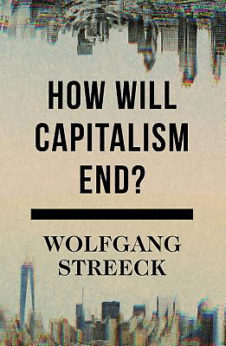
(Morning Star) — Like the Biblical prophets foretelling the end of times, radical critics have predicted the end of capitalism for much of its existence. So far, it has outlived most of them.
Wolfgang Streeck, the Marxist sociology professor from the University of Cologne, has been writing on this subject for a number of years and his thesis on it is striking. His book How Will Capitalism End? offers a powerful prognosis that predicts that the system will suffer a lingering death rather than go out with a bang.
Unlike in the 20th century, when revolutionary movements in the West, Russia, and the post-colonial world sought to overthrow capitalism, anti-capitalist forces are much weaker today. Despite this, Streeck is clear that only one thing is certain: “Capitalism will end and much sooner than one may have thought.”
The demise of the Soviet Union and other models of socialism have removed the political-economic alternative to capitalism and, as a result, the system is eating itself. What the future holds, Streeck contends, is not necessarily better.
“What comes after capitalism in its final crisis, now under way, is, I suggest, not socialism or some other defined social order but a lasting interregnum – no world system equilibrium… but a prolonged period of social entropy or disorder.”
Aside from Marx, Streeck relies heavily on the works of 20th-century social scientist Karl Polanyi, whose Great Transformation argued that the “fictitious commodities” of labor, land, and money had to be protected from the ravages of the market in order to prevent calamitous crises of the system.
But since the emergence of neoliberalism and the decline of social democracy, the brakes have been taken off and the market has eaten into every area of life, leading ultimately to the 2008 financial crisis, austerity, and ever-growing inequality.
Streeck provides a damning indictment of the European Union model of anti-democratic neoliberalism. Though written before the Brexit vote and the Trump victory, it is prescient with regards to the revolt against trade pacts and financial globalization and the rise of populist movements on both sides of the Atlantic.
These political reactions are the ghosts in the machine that have now come roaring into the mainstream.
The new left movements represented by the likes of Jeremy Corbyn and Bernie Sanders do not figure in his work, since the essays preceded their arrival on a wave of popular discontent. In the face of capitalism’s commodification of all aspects of life, writes Streeck, “the only rational and responsible conduct would be to throw as many wrenches as possible into the works of high finance.”
Socialism or the de-globalization of capitalism are the political alternatives that must somehow be grasped, he writes. In the meantime, we get Trump.
If there is an omission in Streeck’s analysis, it is the rest of the world. And, in a globalized economy in which the majority of workers live outside of Europe and North America, this is a very big lacuna in understanding what is happening and what could come next.
But there are so many startling formulations of great analytic power in this book that it merits wide circulation in these troubled times.
 How Will Capitalism End?
How Will Capitalism End?
By Wolfgang Streeck
Verso
Hardcover and Kindle editions
This review originally appeared in Britain’s Morning Star newspaper.










